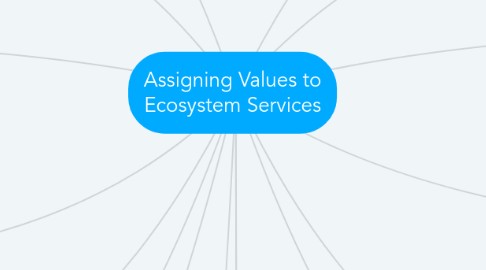
1. professional/espitemological
1.1. environmentalists
1.1.1. well versed in ecosystem services and human impact. Dedicated to preserving the providing scientific data to back claims.
1.2. epidemologists
1.2.1. study diseases spread by humans and environmental organisms. Strong connection to animal carriers and disease prevention/spread.
1.3. lumberjacks
1.3.1. provide raw materials, contribute to deforestation.
2. technological
2.1. renewable energy sources
2.1.1. solar, geothermal, wind, hydro etc.
2.2. technological fixes
2.2.1. preservation plants, dams, flood prevention etc.
2.3. satellite imagery
2.3.1. data collection to illustrate implications of destroying ecosystem services in natural biomes. Could be invasion of privacy.
3. political
3.1. Department of Fish and Wildlife
3.1.1. Spearhead fish and marine wildlife data, can put a price tag on how valuable water sources are and how pollution has contaminated water ecosystems.
3.2. NOAA
3.2.1. proponent of researching and informing public on oceanic and atmospheric conditions, huge player in convincing people to value ecosystems more
3.3. Environmental Protection Agency
3.3.1. Governmental agency tasked with protecting ecosystems often clash with state rights and domain.
4. economic
4.1. Institute for Ecological Economics (UMD)
4.1.1. researches the effects of the environment on our economy. Reliant on grants and research proposals.
4.2. recreational sports in nature profit
4.2.1. sport-fishing, boating, off-roading, hunting etc. all hurt ecosystems and present a trade off in activities that must be regulated
4.3. international trade/commerce
4.3.1. possessing raw materials and the utilization/production of plastics (oil reserves, microplastics)
5. educational
5.1. funding for research
5.1.1. discretionary funds allocated for designated purposes, often not given to environmental research and furthering education
5.2. documentaries
5.2.1. Place at the Table, Omnivore's Dilemma, Inconvenient Truth etc.
5.3. public school curriculums
5.3.1. teaching water cycles, recycling, composting, etc.
6. symbolic
6.1. "human footprint"
6.1.1. self-awareness of human waste and individual impact
6.2. "willingness to pay"
6.2.1. people are more inclined to care in different regions that experience the impacts and are more educated
6.3. Smokey the Bear
6.3.1. Introduced due to increased wildfires and represents environmental crisis- appeals to all age groups
7. political
7.1. environmental imperialism
7.1.1. asserting dominance over countries, being ahead of the curve, Paris Agreement, Greta Thunberg
7.2. lawmakers
7.2.1. pass legislation to regulate land usage, farming practices, roads, infrastructure, funding for technological fixes
7.3. constituent demographics
7.3.1. voting based on what favors constituents, not always what favors environment.
8. Would assigning a value to ecosystem services ultimately lead to a positive mindset change or perpetuate the problem?
9. How can a number value be translated into action and meaning for people who don't feel direct effects of ecosystem service depletion? (making meaning)
10. labor
10.1. construction workers
10.1.1. employed on projects often contributing to ecosystem destruction
10.2. farmers
10.2.1. rely on GMO, pesticides, herbicides lack of biodiversity, overproducing certain crops
10.3. miners
10.3.1. income reliant on extraction of nonrenewable resource. Contribute to greenhouse gas emmissions.
11. material
11.1. timber
11.1.1. deforestation, trees are carbon reserves
11.2. coal
11.2.1. nonrenewable resource, global warming, atmospheric carbon levels, greenhouse gas emissions
11.3. corn
11.3.1. mass production, ethane, animal feed harmful
12. context
12.1. wetlands
12.1.1. water purification system and natural flood control
12.2. boreal forests
12.2.1. our carbon reserves, breathing, carbon extraction, beauty
12.3. marine life
12.3.1. nutrient cycling, easy to put a price tag
13. bodily/identity
13.1. granola/"crunchy" people
13.1.1. people claiming to care about ecosystem services, enjoy recreational outdoor activities, dressing a certain way, using certain products/diets/lifestyle
13.2. millennial vs baby boomers
13.2.1. common stereotype that millennial generation care more about environment than their parents or older generations. Generations that will be most affected by consequences.
13.3. spiritual connection to nature
13.3.1. human relationship/connection to nature being a driver for valuing ecosystem services. Herbal remedies, natural medicine, yoga.
14. mythological
14.1. climate change deniers
14.1.1. those who believe climate change partly due to depleting ecosystem service is a myth
14.2. misconceptions about zoonotic diseases
14.2.1. diseases are spread by bats, social distancing, vector borne illness, anti-vaccine etc.
14.3. religious beliefs
14.3.1. Jehovah's witnesses, scientologists
15. textual
15.1. books
15.1.1. environmental history, weather almanac (textual sources listed)
15.2. websites
15.2.1. National Geographic
15.3. statistics
15.3.1. U.S. Army Corps of Engineers valuing acres of land
